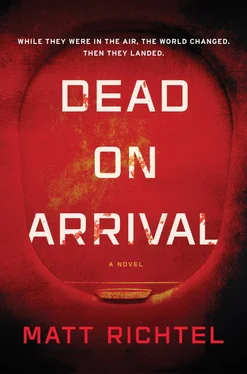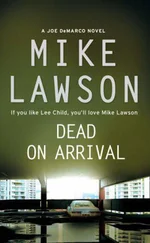Lyle scanned the auditorium. “There’s a great phrase to describe Dr. Hickam’s dictum. It goes like this: the patient may have as many diagnoses as he damn well pleases.” Laughter. “Which brings us to Saudi Arabia.” He told them previously that he’d done some early training in the Epidemiology Outbreak Office for the Centers for Disease Control. After doing a stint like that, the government would occasionally ask Lyle, or others in the program, to visit a place or person in need of a specialized medical consult.
“A guy in the State Department called and asked me if I’d go visit a government minister in Riyadh,” Lyle told the audience. He said the State Department officer told him that the guy had MERS and wasn’t responding to treatment. First class ticket, three-day turnaround, Lyle could stay at a palace.
Lyle seemed not to notice how much he had his audience rapt. He did, though, notice the dean, standing in the aisle near the back, and, more than her, he noticed the man next to her, wearing the too-tight suit. The man stood solidly, not rocking back and forth impatiently like the dean, watching Lyle, studying him.
“I’m sure you’ve read up on MERS,” Lyle addressed the students. “But as a refresher…” He told them about Middle East respiratory syndrome coronavirus. It reared its head in 2012 in Saudi Arabia, thought to originate in camels. Symptoms include severe cough, gastrointestinal issues, kidney failure. It can be fatal. Lyle flew to King Khalid airport in Riyadh, got whisked past to a midlevel palace and an opulent bedroom turned medical suite with a man in his seventies prone in a gold-posted bed under a canopy. The minister.
Next to the bed stood a bodyguard in telltale fatigues, and a nurse with ice for the old man’s lips and, cross-armed, his doctor, looking grave. The doctor gave Lyle an update: a CT scan showed a nodule on the lung, consistent with a MERS diagnosis, diarrhea, mostly consistent with it, and also stiff neck, light sensitivity, bouts of confusion.
“What’s lesson number one?” Lyle asked his audience.
Voices from the audience in dystonic harmony: “Take a history.”
So much of infectious disease diagnosis comes from taking a careful patient history. That was the thing Lyle told this class, and every class, on day one. Get a pet history, food history, sexual history, ancient history, and new history. Frontline doctors, in the emergency room or even at clinic, can see symptoms consistent with a pathology, make a fairly reached conclusion about diagnosis but one that is at odds with history.
“I pulled up a chair next to the minister. People need to feel you are the same level that they are on. Never forget the power of your white coat to unnerve; there’s almost nothing you can do to diminish it. So find the humblest place you can. The less arrogance you communicate, the more likely that most patients will share a real history with you. In the case of the minister, the second that I sat down, he dismissed everyone in the room with a wave of his hand. The bodyguard didn’t move and then the minister swatted him out as well.” Lyle then explained that he had asked the minister basic questions to establish a baseline of communication and gauge cognition. How old was he (seventy-one); where was he born (outside Medina); what was he a minster of (domestic police); did he have a family (yes, wife, two sons, and a daughter); did he have much interaction with animals (no); what was his diet like?
“Are you a doctor?” the minister asked Lyle.
“Yes.”
“Then get on with the doctoring,” the man said. He had a white beard and he had been heavy once. Sleeplessness tore at his eyes and left cracked skin at each corner of his mouth. Fear and inner ugliness trickled out in his voice, the sound of a powerful person unaccustomed to feeling helpless.
“The minister’s comment that I should get on with the doctoring was an important moment,” Lyle explained to the students. “It told me that this might be one of those people who actually preferred me to be in a position of authority, rather than one of mere expertise. I don’t want to make more of bedside style than necessary, but I also want to tell you how essential the role of listening, really listening, is. In this case, he was telling me I didn’t need to be so humble after all.” He paused. “So I could just go ahead and be the arrogant jerk my wife tells me that I am.”
There was a smattering of laughter but not so much. Lyle continued with the story. Next to the minister’s bed, Lyle cleared his throat.
“May I examine you?”
The man struggled to pull himself up on his bed.
“Just turn over,” Lyle told him. “Please, pull off your shirt.”
The minister removed the body-length nightshirt, his back exposed. Lyle ran his hand along wrinkled skin over depleted back muscles. He spent some time moving the skin around on the man’s neck.
“Right-handed, played a sport. You have slightly more developed muscles and scar tissue on the right.”
“Hound hunting.”
“You’ve had some hearing loss.”
“Yes.”
“Did the hunting cause your hearing loss?”
“No. How can you tell about my hearing?”
“Small mark on the skin around your ear. Sometimes, that area can get itchy if the nerves get irritated from a hearing aid. Behaves like dry skin.”
“My hearing loss is a state secret. I have to pretend I’m listening to the king.”
“Of course. Doctor/client privilege. How long have you been married?”
“Sixty-one years.” The minister was starting to relax. That was the goal. Yes, Lyle was looking for any unusual external markings, bites or lesions, signs of infection. Mostly, he was getting the man to relax. This was a veritable backrub.
“You are monogamous—with your wife?”
“The only woman for sixty-one years.”
An hour later, Lyle had been over the man head to toe. He’d looked at the chart, read the CT scan. He’d looked in the man’s eyes, causing the minister to recoil, confirming the light sensitivity. He cocked his head back and forth, like a metronome, lost in rhythmic thought.
Back in the auditorium at UCSF, the audience hung on his story, much like Lyle had the minister caught up in the examination. It had been an act of trust building.
“I explained to the minister that I thought we needed one more test,” Lyle told his audience of med students. “Would anyone like to guess what that test was?”
Lots of looks down by students at their laps. Even in an audience this big, many students felt like they’d not like to let down Dr. Martin with a flier, a wrong guess. From the back, a hand rose.
“Yes,” Lyle said. “No hands needed here. Just let ’er rip.”
“An MRI of his brain,” said a woman’s voice. “With contrast, I’d guess.”
“Very good.” Lyle nodded approvingly. “Just what I told the minister. Almost my exact words.”
The minister said, “Sure, yes. If you say so. What will that tell us, Dr. Martin?”
“The MRI is going to show us your brain. I suspect, strongly, it will show us a fungal infection. Crypto meningitis.”
“So that’s what I have? Meningitis?” The minister pushed himself up on his bed, his gown back on, his face strained with pain he struggled to hide.
“Yes and no.”
“Which is it: Yes or no?”
“The fungus is a by-product.”
“Of what? Of the MERS?”
Lyle felt it had gone on long enough. “I’d like to talk about your sexual history.”
“I told you already. I’m married.”
“And you’ve never been with another woman.”
“You are testing me?”
“You’ve been with a man.”
“Excuse me?”
“I believe you’ve got HIV, on top of MERS. It would be simple enough to give you an HIV test to prove it. But I bet your doctor wouldn’t even allow himself to think about such a test. It would insult you and even be dangerous. I hear they flog people here for that sort of behavior.”
Читать дальше












